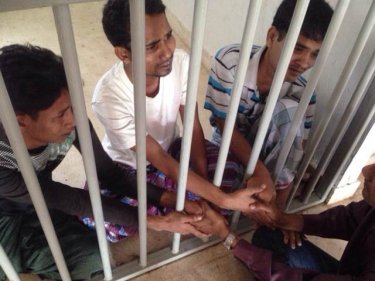PHUKET: Human trafficking in Thailand is at a tipping point - and so, for different reasons, are the scales of justice.
The flow of fleeing Rohingya and Bangladeshis has ceased for now, with boatpeople observer Chris Lewa of the Arakan Project telling Phuketwan that ''absolutely no boats'' are departing at present.
Authorities in Bangladesh have cracked down on touts who once enticed young men onto boats with the promise of better jobs in Malaysia, and who were rightly described as kidnappers.
In Myanmar, the election triumph of Aung San Suu Kyi has left the stateless Rohingya wondering if there's hope for change, and perhaps even citizenship.
While the signs are not overwhelmingly positive, at least there's hope. No news is good news.
Oddly, while the shift in Myanmar has been towards democracy and justice, Thailand has been heading in the opposite direction.
Witnesses being held in detention ready for the trials of those accused over trafficking say they face increased levels of intimidation.
If these witnesses fall silent or even escape, cases will not be pursued.
The policeman who headed the five-month trafficking investigation, Major General Paween Pongsirin, has not only spoken about being intimidated but gone one step further and quit the force.
His impending transfer to the Deep South, where members of trafficking networks remain unarrested, would have exposed him to great danger.
It's not clear why the Thai authorities have been unwilling to provide proper security for witnesses and witnesses' families, or why the human trafficking probe was brought to a sudden halt with many more suspects yet to be investigated.
While those who have already been charged deserve a fair trial, the US State Department is bound to be unimpressed if cases fall apart because witnesses - and even investigators - are being intimidated.
Thailand could not expect to be moved from Tier 3, the lowest level on the Trafficking in Persons scale, unless some convictions for trafficking are recorded.
For years, the business and the profits grew along Thailand's Andaman coast. Billions of baht changed hands.
The thought that people who have been involved in the evil trade are still free and apparently untouchable rankles with many observers.
Fair treatment of the Rohingya in Myanmar would solve the problem once and for all, but a magic wand is not likely to be waved.
The moment that the appalling mistreatment of the Rohingya resumes, the boats will be back on the water.
The flow of fleeing Rohingya and Bangladeshis has ceased for now, with boatpeople observer Chris Lewa of the Arakan Project telling Phuketwan that ''absolutely no boats'' are departing at present.
Authorities in Bangladesh have cracked down on touts who once enticed young men onto boats with the promise of better jobs in Malaysia, and who were rightly described as kidnappers.
In Myanmar, the election triumph of Aung San Suu Kyi has left the stateless Rohingya wondering if there's hope for change, and perhaps even citizenship.
While the signs are not overwhelmingly positive, at least there's hope. No news is good news.
Oddly, while the shift in Myanmar has been towards democracy and justice, Thailand has been heading in the opposite direction.
Witnesses being held in detention ready for the trials of those accused over trafficking say they face increased levels of intimidation.
If these witnesses fall silent or even escape, cases will not be pursued.
The policeman who headed the five-month trafficking investigation, Major General Paween Pongsirin, has not only spoken about being intimidated but gone one step further and quit the force.
His impending transfer to the Deep South, where members of trafficking networks remain unarrested, would have exposed him to great danger.
It's not clear why the Thai authorities have been unwilling to provide proper security for witnesses and witnesses' families, or why the human trafficking probe was brought to a sudden halt with many more suspects yet to be investigated.
While those who have already been charged deserve a fair trial, the US State Department is bound to be unimpressed if cases fall apart because witnesses - and even investigators - are being intimidated.
Thailand could not expect to be moved from Tier 3, the lowest level on the Trafficking in Persons scale, unless some convictions for trafficking are recorded.
For years, the business and the profits grew along Thailand's Andaman coast. Billions of baht changed hands.
The thought that people who have been involved in the evil trade are still free and apparently untouchable rankles with many observers.
Fair treatment of the Rohingya in Myanmar would solve the problem once and for all, but a magic wand is not likely to be waved.
The moment that the appalling mistreatment of the Rohingya resumes, the boats will be back on the water.





Great to hear that no boats are currently leaving. That's the crux. If Aung Ann Suu Kyi has the humanity that many of us lauded her for, maybe the Rohingya have some hope. How the hell she's gonna change the hearts and minds of the Burmese people I don't know. A showdown with the monks could lead straight into the Generals hands. Of course, that's only if she's inclined to do so.
Posted by James on November 22, 2015 12:05